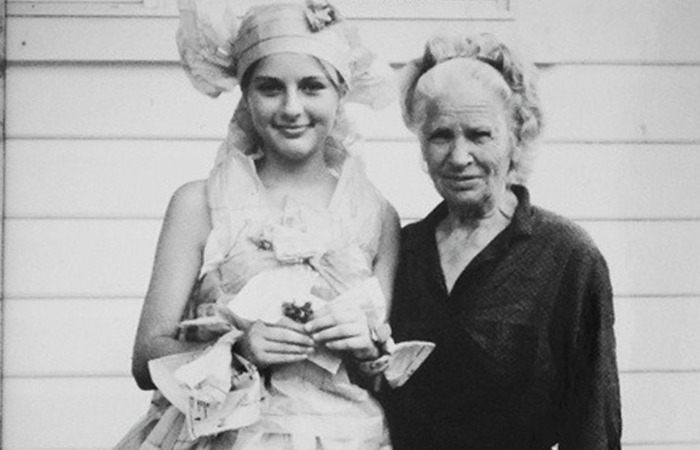
LANGUAGE BARRIERS, LOVE, GRIEF & LOSS
My Macedonian Grandmother – my Baba – passed away in May 2014. At the time, I processed my grief by writing this piece on my old blog.
She was one of the strongest women I’ve ever met in a number of ways, and it seems fitting to share it as the first of posts
on the incredible women in my life.
Idon’t speak Macedonian. I understand a few words here and there, and I can roughly follow a conversation, but I cannot hold one for the life of me. My Baba barely spoke English. She could ask me how I was, and I her; we could have a stilted conversation about our lives, but it never extended beyond that without a translator. But we loved each other anyway.
I thought that I was okay with my Baba coming to the end of her life.
She was 86, and had been unwell for about a year and a half, yet still had her mind. She had lived a hard life, but Australia had been good for her and our family.
About a month ago, she had a stroke and was hospitalised. The stroke triggered dementia, and she went in and out of her days as a young woman living in her village in Macedonia.
I came home from Melbourne for Easter, and went to visit her on my first day back. I was warned that she might not recognise me – that she barely recognised her own children – but that she knew we were a part of her life somehow.
When I walked into the hospital room and said hello, she smiled and pulled me in for her trademark hug and multiple kisses. But it was clear after a few moments that she thought I was her younger sister, Val, and that my mum was her sister Tina. She told us (through my dad’s translation) that we were terribly spoiled not having to work the fields, and that although Tina was a poor tea maker, I (Val) at least made a decent cup. After about an hour of this discussion that was taking place in the village in her mind, we made our excuses.
As I leaned in to say goodbye, a look of recognition crossed her face.
“Lichna na Baba,” she said – something that she has reserved for me since I can remember – and roughly translates as ‘Beautiful to Baba’. That tiny act of her finally seeing me felt crushing, and I left in tears.
I saw her once more after that – apparently one of the last times that she was in a good place cognitively – before I left for Melbourne and she began the steep decline.

Last night I went to the family viewing.
My Aunt told me beforehand that before her stroke, she had told her that she wanted the blanket I’d given her for Christmas to be part of her funeral clothes. When I went over to say goodbye, there it was – wrapped snugly around her legs and feet.
Knowing that she had wanted something that I’d given her hurt almost as much as that glimmer of recognition. Because somehow, somewhere between the broken English and the shoddy Macedonian, she was still my Baba, and I was still ‘her’ sweet one. Our language barrier had only held back words.
And as much as it hurts right now, knowing that I was in her thoughts and plans to the end will one day make it okay.
EDITOR’S NOTE:
I wanted to share this piece because it hurt to write. I’ve written a lot of different pieces over the last several years, and this is still the one I’m most proud. Cathartically, it helped my grief to write this story; and it helps to re-read it, cry, and remember her.
the thing you are most
afraid to write.
write that.
– advice to young writers, Nayyirah Waheed
But it also helps to reminds me of how painfully short life is, and pointedly, of how fortunate I am to have incredible family and friends come into my life.
Every time I saw Baba, I would ask her: “Kako si, Baba?” – How are you, Baba? – and she would laugh, sadly, and tell me that she was old. She didn’t want to be old. There were things she wanted to do, experience, explore.
And it makes me feel guilty every time I let my anxiety or dysthymia get the better of me; my life is so full of love that I don’t fully accept or appreciate.
I didn’t grow up as a young woman walking 10km each day into the village, braving bears and bitter winters. I didn’t live through wars, worrying that my loved ones were dead; or move from an impoverished, landlocked central European country to literally the other side of the world for my family.
I wish I’d been able to have these conversations with her – to ask her about her life, so different to my own experience. Instead, I have snippets of a life that brought me into existence.
I sometimes wonder if she’d be proud of the woman I became, or will become. I hope so.



Beautiful and touching thoughts and words about someone I know nothing about, but feels so familiar
Thank you, Brett! And thanks for taking the time to read the blog 🙂
She would be proud of youJess